Author
Read
- at Google Books
- at LibraryThing
- at Amazon.com
Excerpts
- Excerpt from J. C. Wylie’s Military Strategy: Universal Strategy I
- Excerpt from J. C. Wylie’s Military Strategy: Universal Strategy II
- Excerpt from J. C. Wylie’s Military Strategy: Control and the Center of Gravity
- Excerpt from J. C. Wylie’s Military Strategy: The Wylie Terrorist
Notes
“NerveAgent’s” notes from Visions of Empire
NerveAgent’s followup post with his notes on Wylie:
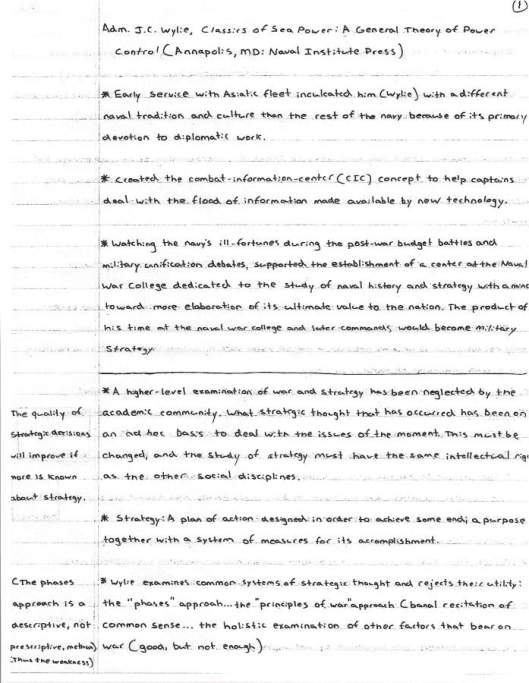
- Page 1
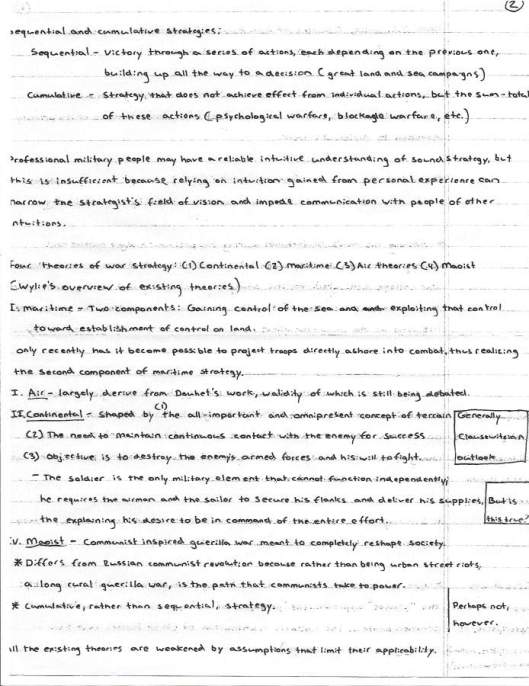
- Page 2
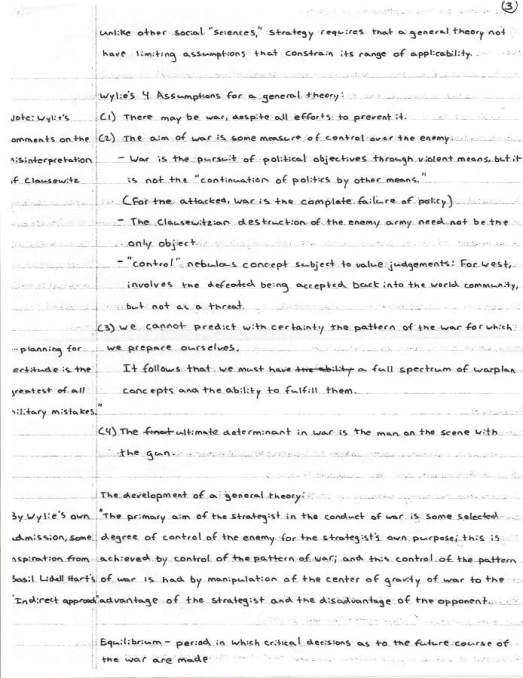
- Page 3
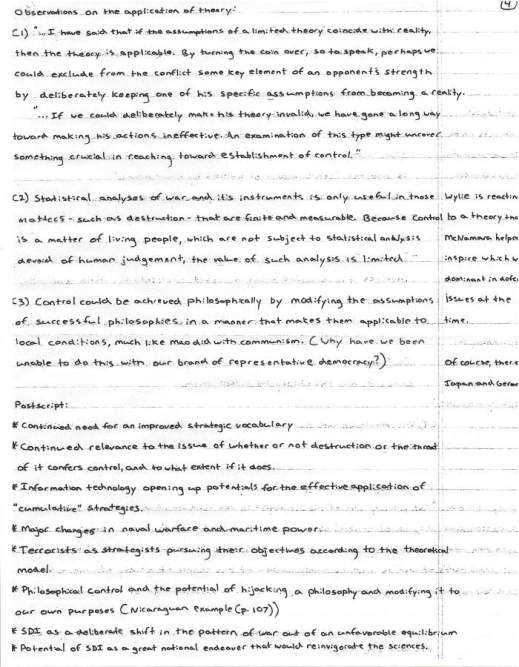
- Page 4
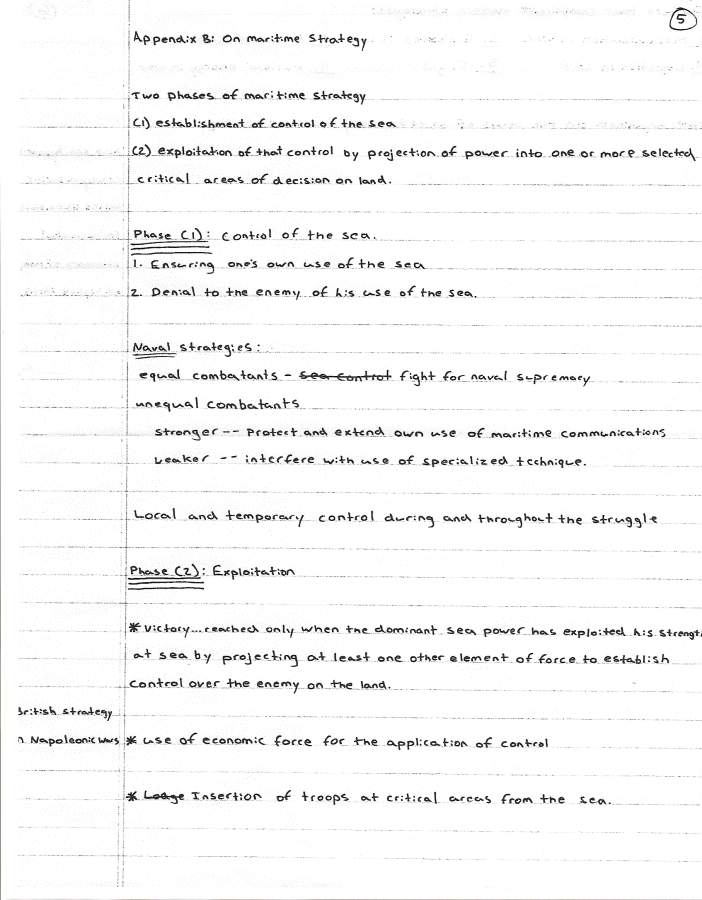
- Page 5
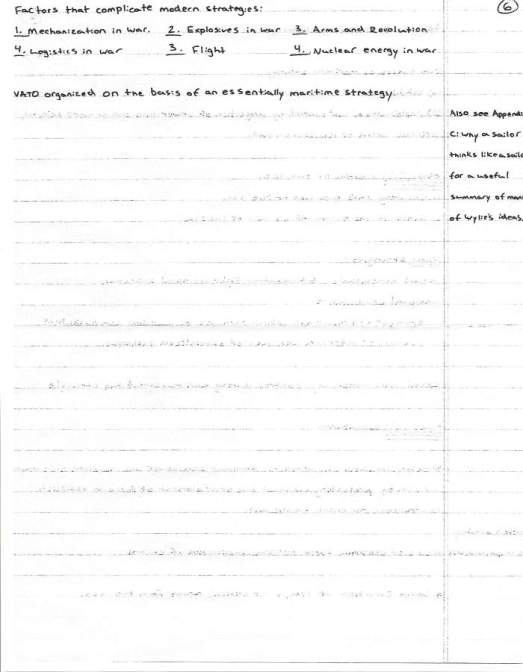
- Page 6

This is a very brief review and recommendation for a book that I discovered recently. Admiral Wylie’s short Military Strategy (about 85 pages in the original edition) was published in 1967, but written in the mid-fifties while Wylie was “at sea in a single-screw low-speed amphibious cargo ship.” He remarked these ships were “not demanding of a captain’s attention as is, for instance, a destroyer.”My copy was published in 1989 by the Naval Institute Press as part of their Classics of Seapower series and has an excellent preface by John B. Hattendorf that will give those unfamiliar with Wylie’s life experience a good foundation. This copy also has a postscript written by Wylie “twenty years later” and three related essays published previously in Proceedings magazine.
Given Military Strategy’s brevity, I’ll resist the urge to provide long quotes. Wylie and an associate’s search for articulating the relevance of the navy in the never-ending budget battles brought them in contact with the famed mathematician John von Neumann of Princeton. Wylie used a paraphrase of von Neumann as a starting point: “With respect to strategy as a subject of study, its intellectual framework is not clearly outlined, and its vocabulary is almost nonexistent. These two primary tasks are badly in need of doing…” He sets out to do just that and does a nice job.
Wylie defines strategy as: “A plan of action designed in order to achieve some end; a purpose together with a system of measures for its accomplishment.” He discusses the military mind and strategy, and how often the military focuses on principles to the exclusion of real strategy. Wylie outlines methods of studying strategy that are simple and well thought-out. Wylie makes a compelling case for a general theory of strategy. He says: “A theory is simply an idea designed to account for actuality or to account for what the theorist thinks will come to pass in actuality. It is orderly rationalization of real or presumed patterns of events.” Further, he continually stresses the importance of assumptions being based in reality, and not wishful thinking or the last war/battle.
His chapter on existing theories is worth the price of the book. He provides a type of Cliff’s Notes overview of the four theories he sees as core: the maritime, the air, the continental, and the Maoist. Of the last, he masterfully lifted sections from Mao’s On Guerilla Warfare, Che Guevera on Guerilla Warfare, and Vo Ngugen Giap’s People’s War People’s Army. He observed of the later, “these books are not only theory, the portray a hard reality of contemporary warfare.” To our people in uniform, in particular, unfamiliar with these books, Wylie provides an accessible and informative introduction to the type of war being waged by Islamic jihadists and how they attempt shape the battle field.
He develops a brilliant point that destruction doesn’t necessarily translate into control, and that often destruction is driven more by emotion than strategy.
Wylie goes on to provide a general theory of strategy that, using his words, has “substance and validity, and practicality.” As Seydlitz89 said in a recent comment thread here: “Wylie is amazing. So many ideas in such a small book! He misread Clausewitz and overrated Liddell Hart – which are probably connected, but overall? He comes up with some very basic ideas about strategic theory which are ever sooooo useful. I’ve re-read his small book several times and always come up with something that either I’d forgotten or that I had missed earlier. Wylie’s basic approach to theory is as a practitioner, not as an academic, much like Clausewitz before him.”
Indeed, Wylie provides a nice scaffold for any type of strategy, military or business. For me his approach was refreshing in a genre where, more often than not, dogma and ego walk hand-in-hand. Time and again, he offers that his ideas may be wrong and encourages readers to think and wrestle with the concepts provided. Wylie writes in his postscript: “As far as I know, no one as ever paid attention to it [the book]. I don’t know whether this is because it is so clear and obviously valid that no one needs to, or because it is of no use at all. I suspect it could be the latter, but I really do not know.”
This little book comes with my highest recommendation. If you’re in uniform and just getting started with strategic concepts/thinking, this is an excellent place to start.
Interesting referenced titles:
Military Concepts and Philosophy, Henry E. Eccles
The Military Intellectuals in Britain, 1918-1939, Robin Higham
An Introduction to Strategy, General Andre Beaufre
Theory of Games and Economic Behavior, John von Neumann
Strategy in Poker, Business and War, John McDonald
Guest Post: Wylie’s Military Strategy
Towards a General Theory of Strategy: A Review of Admiral JC Wylie’s “Military Strategy”
J.C. Wylie: American Clausewitz? byt NerveAgent
The post that launched the Wylie Comeback Tour.